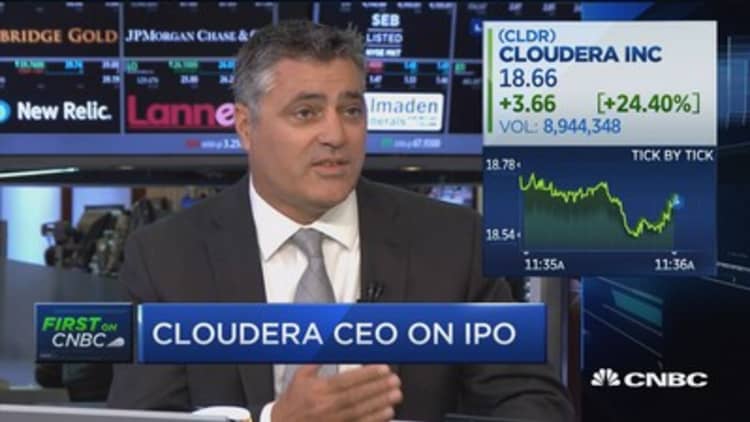
Even though Cloudera's valuation took a hit in its IPO, investors are paying a big premium to own shares of the software developer.
Cloudera jumped 21 percent in its stock market debut on Friday to $18.10, giving the company a market capitalization of $2.3 billion. It's trading at nine times 2016 revenue, almost triple the price-to-sales ratio for rival Hortonworks.
The explosion of online video, social
That's where an open source platform called Hadoop enters the fray.
Cloudera and Hortonworks are two of the three main companies, along with MapR, trying to commercialize Hadoop. Developers can use Hadoop for free to analyze big data sets, but there's so much demand for the technology from large enterprises that vendors are racing to package it in ways that can turn into lucrative businesses.
While Hadoop has been a raging hot technology in recent years, the Hortonworks IPO in late 2014 soured public investors on the market. Hortonworks shares have dropped 12 percent in the past year and are trading 35 percent below the IPO price of $16.
Hortonworks shares
Cloudera has tried to change the narrative, focusing on proprietary software around Hadoop rather than the value of the open source products.
For example, CEO Tom Reilly said on Friday that Cloudera has invested heavily in machine learning tools that are being used for everything from genomic research for finding cancer cures to counterterrorism intelligence and anti-money laundering.
The New York Stock Exchange, where Cloudera shares now trade, uses Cloudera to analyze all its trades to spot anomalous patterns and illicit trading, Reilly said.
"The investment community views us more as an enterprise software company than a support and services company," Reilly said, in an interview from the NYSE.
Among newly public software companies, Cloudera commands a fairly average valuation. Okta and MuleSoft are both valued at around 15 times revenue, while Twilio carries a price-to-sales ratio of 6.3 and Coupa's is 4.1.
A big part of what Hortonworks offers is training and consulting. About 31 percent of its $184.5 million in 2016 revenue came from professional services. Of Cloudera's $261 million in sales, only 23 percent was from services. Both companies lose a ton of money every quarter due to investments in sales and marketing and research and development.
Cloudera still has a long way to go to justify the $4.1 billion
According to Reilly, all of Cloudera's purely financial backers are in the black.
"Every one of our financial investors is having a huge return today," he said.
Correction: A previous version of this story had an incorrect professional services sales figure for Hortonworks.


